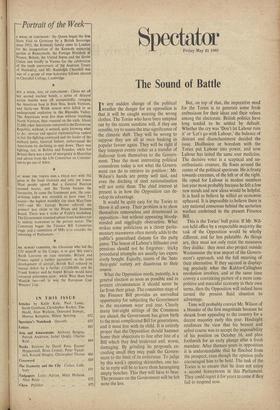The Sound of Battle
IN any sudden change of the political weather the danger for an opposition is that it will be caught wearing the wrong clothes. The Tories who have been tempted out by the recent sunshine will, if they are sensible, try to assess the true significance of the climatic shift. They 'will be wrong to suppose they are all at once basking in popular favour again. They will be right if they interpret events rather as a transfer of disfavour from themselves to the Govern- ment. Thus the most interesting politiCal conundrum today is not what the Govern- ment can do to retrieve its position : Mr. Wilson's hands are pretty well tied, and even the. ditching of steel nationalisation will not untie them. The chief interest at present is in how the Opposition can de- velop its advantage.
It would be quite easy for the Tories to throw it all away. Their problem is to show themselves remorseless and determined in opposition—but without appearing bloody- minded and nigglingly obstructive. What strikes some politicians as a clever parlia- mentary manoeuvre often merely adds to the public's generalised distaste for the pally game. The lesson of Labour's filibuster over pensions should not be forgotten : tricky procedural triumphs are usually too expen- sively bought. Equally, taunts of the 'hate- their-guts' variety are disastrous to their source.
What the Opposition needs, patently, is a general election as soon as possible and in present circumstances it should never be far from their grasp. The committee stage of the Finance Bill provides an unrivalled opportunity for subjecting the Government to the maximum wear and tear. Clearly many late-night sittings of the Commons are ahead; the Government has given birth to the most complicated Bill for generations, and it must live with its child. It is entirely proper that the Opposition should hammer home their objections to line after line of a Bill which they find irrelevant and, worse, damaging. By grinding its proposals ex- ceeding small they may push the Govern- ment to the limit of its endurance. To judge by this week's opening skirmishes, one tac- tic in reply will be to leave them haranguing empty benches. This they will have to bear. The pressure on the Government will be felt none the less. But, on top of that, the imperative need for the Tories is to generate some fresh enthusiasm for their ideas and their values among the electorate. British politics have long tended to be settled by default. Whether the cry was 'Don't let Labour ruin it' or 'Let's go with Labour,' the balance of distrust and disenchantment decided the issue. Disillusion or boredom with the Tories put Labour into power, and now Labour has tasted the same sour medicine. The decisive voter is a sceptical and un- enthusiastic creature. He floats around the centre of the political spectrum. He is frosty, towards extremes, of the left or of the right. He opted for Labour in modest numbers last year most probably because he felt a few new minds and new ideas would be helpful. It is hard to believe he willed an economic upheaval. It is impossible to believe there is any national consensus behind the sectarian warfare enshrined in the present Finance Bill.
This is the Tories' bull point. If Mr. Wil- son held office by a respectable majority the task of the Opposition would be wholly different, and far less palatable. As things are, they must not only resist the measures they dislike : they must also project outside Westminster the true import of the Govern- ment's approach, and the full meaning of their alternative. If they succeed in display- ing precisely what the Kaldor-Callaghan revolution involves, and at the same time convey a convincing picture of a more com- petitive and muscular economy in their own terms, then the Opposition will indeed have turned the present fluid situation to advantage.
Time will probably convict Mr. Wilson of a blunder of the first magnitude because he shrank from appealing to the country for a decent majority early this year. Hindsight reinforces the view that his bravest and safest course was to accept the impossibility, of his position on October 16, and plan forthwith for an early plunge after a fresh mandate. After thirteen years in opposition it is understandable that he flinched from the prospect, even though the opinion polls encouraged him to be bold. The task of the Tories is to ensure that he does not enjoy a second honeymoon in this Parliament. They could regret it for years to come if they fail to respond now.






























 Previous page
Previous page